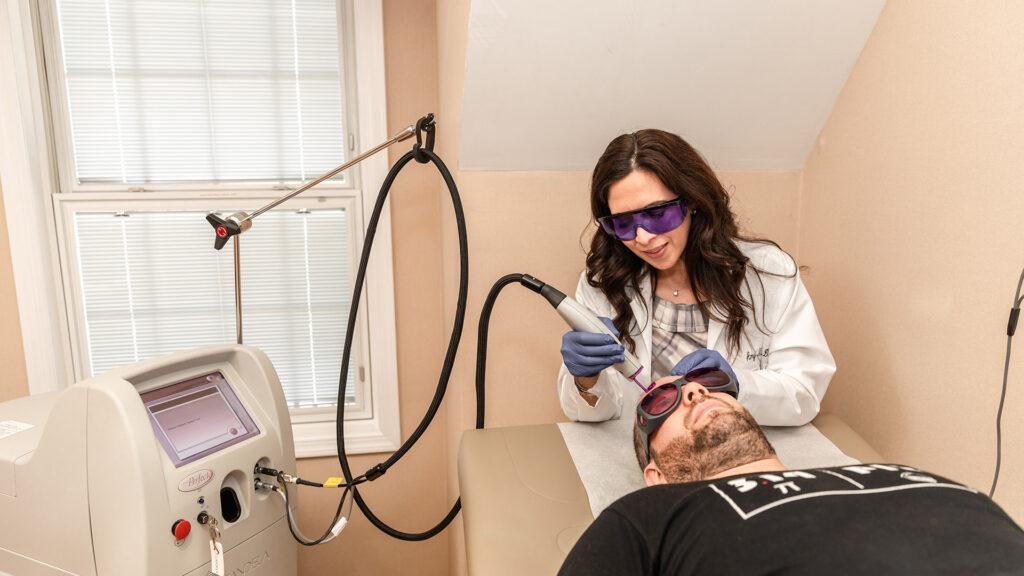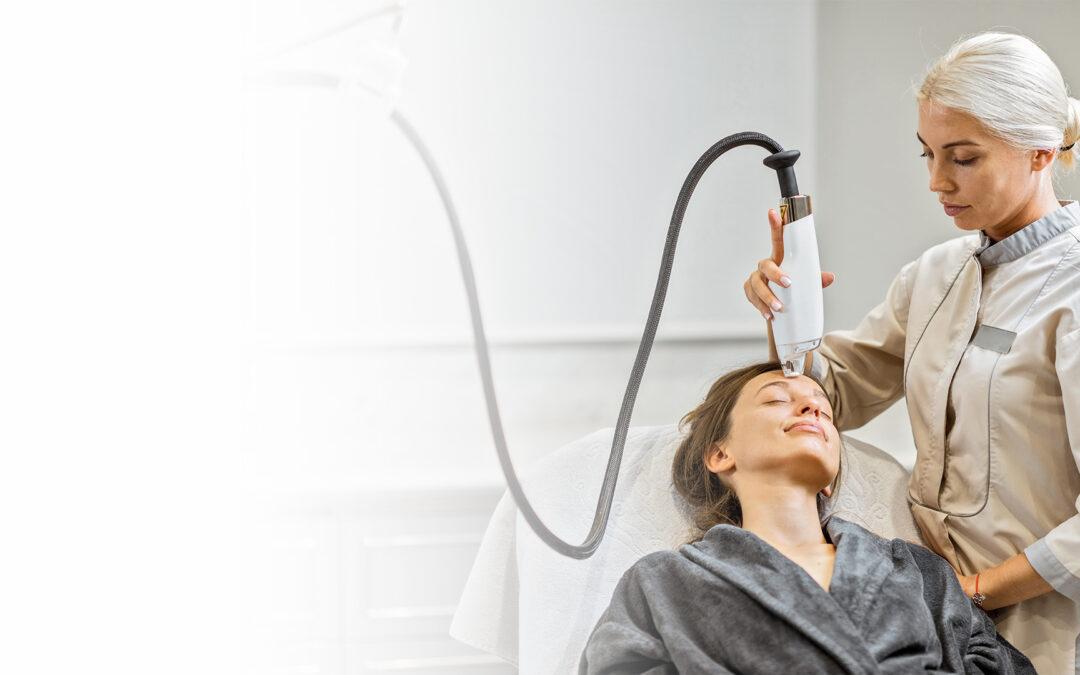Having dark spots or patches on your skin can make you feel self-conscious about your appearance. These spots can occur for a variety of reasons, but the good news is that no matter their cause, there are treatments available to reduce or eliminate them.
At Millburn Laser Center, our board-certified dermatologists offer a variety of non-surgical treatment options to help our patients achieve all their aesthetic goals. We also provide a full range of medical dermatology services, effectively treating challenging conditions like melasma and psoriasis. With more lasers than any other skin care clinic in the area, we can customize treatments for our patients to produce the best possible results.
What is Hyperpigmentation?
Hyperpigmentation is skin that has turned darker. It can present as spots, patches, or even larger areas of the skin. Common types of hyperpigmentation include:
- Sun spots – Also known as age spots, solar lentigines, or liver spots, these spots can vary in size and color and usually occur on sun-exposed areas of the skin like the face, arms, and hands.
- Melasma – This chronic skin condition is characterized by patches of discoloration that can occur nearly anywhere on the body. Melasma can be effectively managed, but there is no cure for this condition.
- Post-Inflammatory Hyperpigmentation (PIH) – This discoloration is usually due to an injury to the skin or by acne. It can occur when laser treatments are performed improperly on patients with darker skin tones.
To learn more about hyperpigmentation, please visit pubmed.gov.
Hyperpigmentation Causes
Skin color comes from a pigment called melanin, which is produced by skin cells known as melanocytes. Excess melanin production can lead to hyperpigmentation in its various forms. There are different reasons why too much melanin might be produced, but some of the common triggers include.
- Sun exposure
- Hormonal fluctuations
- Reaction to skincare products
- Laser treatments performed incorrectly
- Some medications
- Trauma to the skin
Because people with darker skin tones have more melanin, they are also more prone to pigment changes.
Hyperpigmentation v. Hypopigmentation
While hyperpigmentation is the darkening of patches or spots of the skin, hypopigmentation, or vitiligo, is the opposite. Vitiligo is a medical condition when the immune system attacks the melanocytes, so they no longer produce melanin. Without melanin, areas of your skin turn white or lose their color. The severity of hypopigmentation varies from one person to another.
When Hyperpigmentation is More than a Cosmetic Concern
Hyperpigmentation can be the result of various skin conditions, such as:
- Age Spots
- Skin Tags
- Seborrheic Keratosis
- Dermatosa
- Keratoacanthoma
- Dermatofibroma
- Melanoma
Since some hyperpigmentation may be skin cancer, or a symptom of a condition like Addison’s disease or hyperthyroidism, it is best to have the discoloration checked by a board-certified dermatologist. Once the hyperpigmentation and its cause is identified, we can create a treatment plan to address it.
Treatments for Hyperpigmentation
At Millburn Laser Center, we offer a variety of treatments for hyperpigmentation, including:
Laser Treatments
 Laser treatments are often an effective treatment for hyperpigmentation. These devices deliver a single beam of light into the affected area, breaking up the melanin to eliminate the discoloration. Some lasers also stimulate collagen production to improve the look and health of the skin. At our skin care clinic, we have two specific lasers we often use for pigmentation concerns, depending on the type and color of the spots that need to be addressed.
Laser treatments are often an effective treatment for hyperpigmentation. These devices deliver a single beam of light into the affected area, breaking up the melanin to eliminate the discoloration. Some lasers also stimulate collagen production to improve the look and health of the skin. At our skin care clinic, we have two specific lasers we often use for pigmentation concerns, depending on the type and color of the spots that need to be addressed.
Fraxel®
Fraxel is a fractional laser treatment that works by creating micro-channels in the skin that stimulate the body’s healing response. It improves tone, texture, and radiance for sun-damaged, aging, or scarred skin. This device can be effective in reducing brown spots. Treatments are relatively comfortable, thanks to topical numbing applied before the procedure. Patients may have a few days of social downtime, depending on the depth of the treatment.
Vbeam®
Vbeam is an advanced pulsed dye laser (PDL) that works well on redness. This laser targets the hemoglobin in the blood to eliminate red marks without damaging the surrounding area. Specific concerns treated with the Vbeam include:
- Hyperpigmentation
- Pigmented scars
- Spider veins
- Birthmarks
- Broken capillaries
- Cherry angiomas
- Rosacea symptoms
Vbeam treatments are tolerable since we apply topical numbing before treatment. Patients liken the experience to a rubber band snapping against the skin. There is no downtime after a Vbeam procedure, although it is essential to protect the skin from the sun afterward to prevent potential damage.
RF Microneedling
A minimally-invasive skin rejuvenation treatment, RF microneedling combines the collagen-boosting effects of microneedling with the gentle heating of radiofrequency energy. In addition to treating some types of hyperpigmentation, It may help improve skin texture and tone, reduce fine lines and wrinkles, and minimize acne scarring.
Morpheus 8 is the RF microneedling device used at Millburn Laser Center. It is safe and effective for nearly all skin types and tones. The procedure can be performed on any area of the body. We use a local anesthetic to ensure Morpheus 8 treatments are comfortable for our patients.
Chemical Peels
A chemical peel is a facial resurfacing procedure that removes damaged outer layers of the skin to improve the look and feel of your skin. They can also stimulate collagen production for natural, long-lasting results. These treatments come in a variety of depths so we can customize your procedure to your precise needs and goals. Deeper treatments involve local anesthesia and some recovery time afterward, but also produce the most dramatic improvements in the skin.
Schedule Your Hyperpigmentation Treatment at Our Skin Care Clinic Today
Do you want to learn more about hyperpigmentation and its treatments? Contact our board-certified dermatologists in Millburn, New Jersey at 973-315-8590 to schedule an appointment.

